#character: Moonfish
Explore tagged Tumblr posts
Note
any headcanons of moonfish from my hero academia to spare? I'm petting his latex head
Hi Nonnie!! Here’s your headcanons! Hope you enjoy!
Moonfish(BNHA) headcanons:

Very cuddly boy
Loves curling up around you
Stays close at all times, practically attached to your hip!
he loves getting pets
its his ultimate joy in life
loves giving you kisses
and I don’t mean normal kisses, I mean dog kisses
Loves to nibble on you
Leaves bites and marks all over you
Definitely purrs
Would happily kill for you if someone hurt you
Put this little beast on a leash because he might do it regardless Mod Antler

#headcanons#source: my hero academia/boku no hero academia#character: Moonfish#request#mod antler#selfship#selfship requests#selfship community#self ship#selfship headcanons#anon#teeth cw#violence cw
3 notes
·
View notes
Text
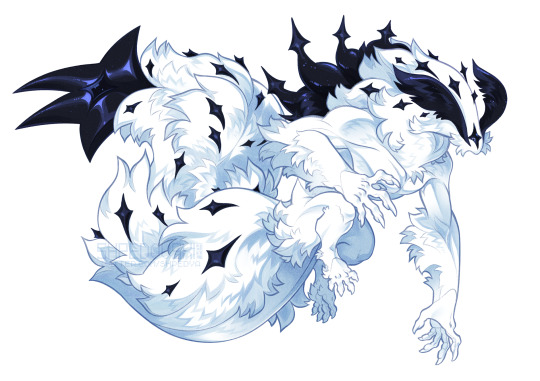
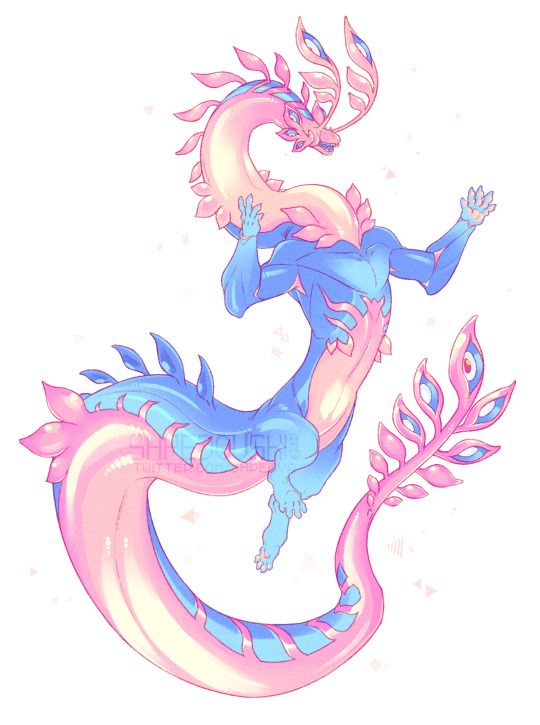
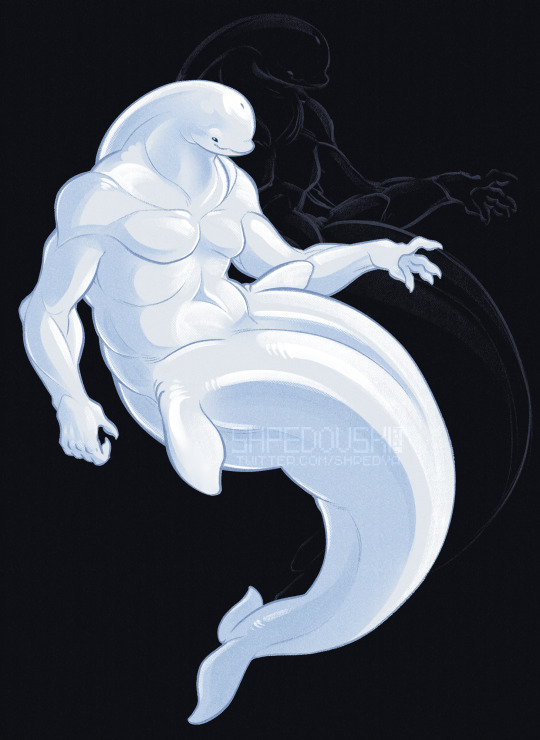
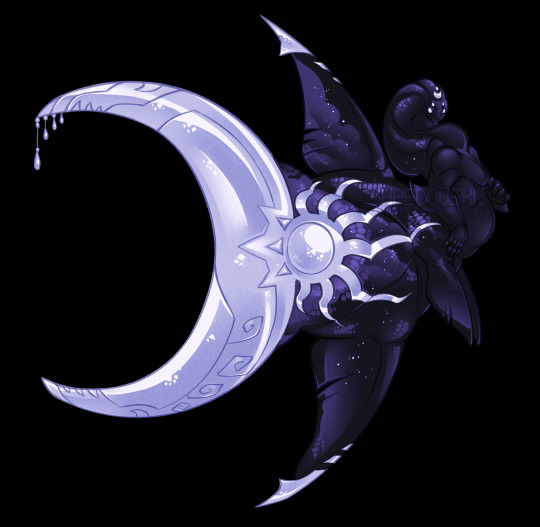
more fish and nudibranch people, a lot of monochrome in this batch
#creature design#character design#oc#original character#anthropomorphic#anthro#mermay#mermaid#merman#merfolk#sea bunny#nudibranch#mola mola#sunfish#moonfish
2K notes
·
View notes
Note
ok so moonfish is like one of my favorite bnha characters and I'm genuinely so surprised someone else has brainrot for him. can u tell me some thought you have on him...... like what do you think hes like?
I've always had a theory that his quirk makes him only capable of eating humans. that he's been starved so much and for so long that he's gone insane over flesh and hunger. that fits really well with the themes of shiggys squad. what do you think is the reason for his insanity snd cannibalism?
HELLO HELLO i've been crazy busy, but every so often i open tumblr and stare gleefully at this ask. and now i can finally answer it!
From what I remember of MHA canon, Moonfish had made a pretty big name for himself in the villain world up to and beyond his first imprisonment. We can assume he possesses some degree of survival skill/intellectual capability, to the point where he's become so serious of a threat that death row is warranted. Even during Moonfish's intro at the training camp raid Bakugo and Todoroki comment on his use of terrain and how "he's clearly been in a lot of battles".
An aside: Ultra Archive initially rates Moonfish's intelligence as a 3/5 while Ultra Analysis later gives him a 1/5 :((( they revoked his braincells...
He probably CAN eat other things aside from people; they had to keep him alive in Tartarus for a while, and feeding the guy on death row Human Meat wouldn't be very ethical (not that the heroes have outstanding moral judgement anyway). From what we've seen of his body he looks to be in decent shape so they're not starving him either.
It's true that most of the LoV have quirks that influence their personalities/behavior (ex: Toga, Twice, possibly Muscular to an extent?), so Moonfish is likely in a similar situation. I'm not going to speculate on the details of his mental illness--my interpretation of him is largely based on my own experiences. Maybe the hunger is episodic, or maybe it wasn't as bad a few years ago or when he was younger and is now just spiraling. Maybe it's a stress-eating kind of thing. I think he never had access to the necessary resources/professional help/therapy/idk to help him navigate his quirk, and now it's "too late" and he's "beyond saving".
I suppose he's so loyal to the LoV simply because they respect him, more or less, as a person and a teammate. He's fixated with "doing his job" because that job lets him belong somewhere.
This is definitely outside the scope of BNHA main series but I like thinking about a little future for him, where he sort of drops off the radar and goes somewhere quiet and just, learns to live with himself.
I have loads more headcanons; if you're curious, just ask! Thank you for giving me an opportunity to wax poetic about my guy lol
#moonfish#jasks#(jay's asks)#my hero academia#mha#boku no hero academia#bnha#meta#i think this is meta at least#behind every weird character is a 20-something college student who's obsessed with them#bnha moonfish#mha moonfish#league of villains
26 notes
·
View notes
Text
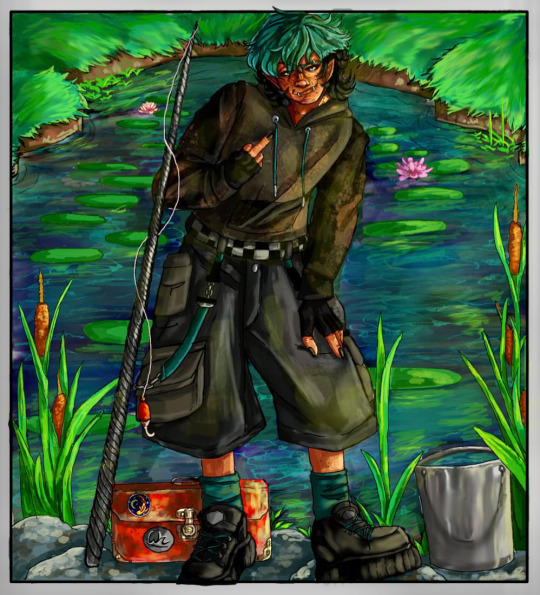
Eventually I’ll draw my Wizzy OC Belgrim in his actual Wizards outfit but for now it’s his grunge fashion nonsense
He LOVES fishing and getting all the magical fish >:D
#wizards 101 character#wizards 101 death school#wizards101necromancy#wizzy oc#wizzy art#wizzy fandom#wizard shit#wizard#wiz101#school of death#w101 oc#w101 fandom#w101 art#w101#moonfish#wizards 101 fishing
20 notes
·
View notes
Text

Say Hello to Ampellio! I made this reference for Artfight, but he's been rattling away in my brain for a long while!
He's the counterpart to Exelia, my sona! Which makes him my sona as well, in a way :] In their story, he takes the primary role as the antagonist.
#ampellio#the moonfish#my art#digital art#character design#rolls him around in my hands#Ampellio is an important one for me#I dont really get into my Mental Faculties on the interwebs but he's an important part of who I am#He is who i was. and am. and part of who i always will be#He is and is not me#He could never be Me again but we are one and the same etc etc#Exelia's story is largely one told to parallel my life and who I am- to express my relationship with myself through fiction#I dont often talk about them! this world largely exists as loose concepts and feelings but its there!#but regardless. pinches Ampellios cheek#It took me AGES to pin down a design that felt remotely fitting. so meet The Moonfish 🌙🐟
3 notes
·
View notes
Text
Never gonna shut up about the mysterious behind the scenes development that led from this

to Shigaraki making Dabi his second in command and giving him a personal noumu at the summer camp.
This is Shigaraki at his worst, before the character development, before taking care of his comrades became another of his objectives. This is Shigaraki fresh after the failed attack on UA, who had left a hundred of villains to get arrested by the villains, who will soon let Muscular, Mustard and Moonfish to be sentenced to Tartarus without batting an eye. This is Shigaraki the destructive brat, desperate for respect and validation, willing to decay anyone who fails to deliver. This is Shigaraki before he realized being a leader is not sitting on a throne prepared for him by AFO, before he realized being a leader means giving back, taking care of those who decided to follow him.
And Dabi came to the bar and proceeded to disrespect Shigaraki for the entirety of their interaction. It's Dabi's behaviour alone that makes Shigaraki snap and attempt to kill both him and Toga.


0 respect, 0 participation, 100% being a bitch. Dabi, who told you this was a good strategy for a job interview. Even if this wasn't for a villain organisation, your potential employer would have ended up beating you up for this.
Both of them survive Shigaraki only because Kurogiri physically restrains him and talks him down. Shigaraki has to physically leave the bar to be sure Toga and Dabi won't end up dead from his hands.
So, once again, how on earth is Dabi still alive at the forest camp, and also the one Shigaraki personally put in charge?
#by now I'm starting to think Shigaraki got a personal Dabi's dance as early as on their second meeting lol#bnha#boku no hero academia#league of villains#shigaraki tomura#shimura tenko#dabi#todoroki touya#shigadabi
483 notes
·
View notes
Text
Character Flaws vs Writing Flaws:
While catching up on some of the stuff people have commented/sent to me, I noticed someone mention how Katsuki being a bully is a flaw of his and that not every character needs to be a good person.
First of all, when did I ever say that a character has to be morally correct to be a good character? Some of my favorite characters are villains who’ve done worse things than Katsuki.
So what’s the difference between them and Katsuki?
Well, the villains have a reason for existing. Joker is meant to serve as a parallel to Batman, challenging his morals while also showing what an unhinged Batman could look like.
On a much lesser scale, despite his extremely limited screen time, Moonfish’s bloodlust, lack of sanity, and cannibalism serve two purposes in MHA: to showcase Fumikage’s power and to give the readers an example of what the heroes of this world have to deal with.
Katsuki’s flaws are meant to show the flaws of a world that values raw power over morals, but he fails at this. The reason why? His flaws are never allowed to be flaws.
Katsuki’s aggressive and hostile nature should have him struggling to make friends, yet he has the two pillars of 1-A, that being Ejiro and Denkias described by Hori, immediately befriend him with no issues. His inability to empathize with others should have people wanting to steer away from him, but his instead 1-A loves him, Eri loves him despite being the last person who would, and anyone who doesn’t love him is seen as being in the wrong.
Katsuki is meant to be a big fish in a little pond, someone whose ego isn’t challenged until a certain point, and the Battle Trials were meant to show this. While yes, Katsuki has a mini-breakdown over the fact that he’s no longer in a class of people with weaker quirks, he has no issue claiming a spot as a Top Dog and he still continues to demean the people around him.
Katsuki’s aggressiveness is meant to be both a flaw and an asset. His aggressive nature is what motivates him to defeat the villain, but it’s supposed to cause him to have a one track mind when it comes to hero work. Rescue, teamwork, all of that is ignored by him to fight the big bad. His ego caused everyone to have a tougher time during the USJ, but is that ever touched upon? Nope. It’s just ignored. When Katsuki saved Kyouka, there was no buildup to it. It just happens. We never see him struggle with teamwork because everyone else follows him like a lost puppy.
Meanwhile, Izuku is meant to be Katsuki’s parallel in this department. He’s meant to showcase why too much selflessness isn’t good while also showing that a hero is more than just their raw power. Problem is, Izuku gets completely shat on no matter what he does. He goes after a villain to protect U.A? Gets criticized. Does his best to work with Katsuki? Gets blamed despite it solely being an issue on Katsuki’s end. Does everything perfectly? Nope, still not enough. Compared to Izuku, who always seems to be in the wrong, Katsuki’s placed as this paragon of heroic virtues despite the fact both characters are supposed to be two halves of a whole. They’re supposed to learn from one another. Problem is, Katsuki’s flaws are always ignored while Izuku’s positive traits are demeaned.
Finally, Katsuki being a bully is supposed to serve as a starting point for his character. He’s meant to grow and develop as a human being. Again, he doesn’t, or at least he doesn’t do so in an organic way. He never suffers consequences for his behavior, he’s constantly propped up and coddled instead of criticized, and he’s given some heroic moments despite there being no buildup to them. In the span of a month he goes from nearly killing Izuku to risking his life for him. Where the hell did that come from? Honestly, I wouldn’t care if Katsuki being a bully is his sole purpose for existing, but he’s meant to be more than that. This is supposed to be a well developed and fully fleshed out character who grows from his selfishness and is meant to show that anyone can be a hero, no matter their starting point. But when the development is crap and he hardly changes outside of some OOC moments, then his flaws cease to be flaws that he’s meant to overcome. Instead MHA treats it as him being quirky and misunderstood.
In conclusion, you just can’t present something as a character flaw and expect it to serve as an excuse as to why a character exhibits said flaw. You have to think of the following: what purpose does this flaw serve? Is it meant to be used to teach a lesson? Does it set something in motion, whether it be the development of this character, another character, or does the flaw cause the character’s downfall? The only thing Katsuki’s flaws does right is that they set up Izuku’s story, which again would be fine if that’s Katsuki’s purpose, but it’s not. Him being a bully isn’t something that he overcomes in a natural way. His redemption story is the equivalent of filling things out of a checklist without being fleshed out. Every time he screws up, it’s never treated as a screw-up. Oh he failed the hero license exam? Well so did Shoto so he’s not unique there, and the proctors still suck his dick even while he’s “failing”. Him being the reason for 13’s injuries? Never brought up.
Katsuki’s flaws don’t piss me off because they are flaws, but because the writing of his character IS so deeply flawed despite being a centralized character in the story.
Oh, and as always, someone can dislike a character for whatever reason they might have. If people don’t like Katsuki because he’s a bully, then they have every right to. What I wrote is a response as to why I think Katsuki’s a shit character and how it’s not because of his flaws themselves, but how Hori goes about writing these flaws.
#anti katsuki bakugou#anti bakugo katsuki#anti bakugo#anti bakugou#mha critical#anti bakugou katsuki#bnha critical
377 notes
·
View notes
Text
get to know higashikuramori shin! q1-4 questions by @/miriaocs | next part
1. name: what does your twst OC's name mean? why does Rook/Floyd call them [insert nickname]?
when choosing shin's name, i made sure that every kanji has a meaning that fits them in one way or another:
東 (higashi) - east, oriental, tokyo 蔵 (kura) - accumulate, to conceal a secret 盛 (mori) - to pile up
眞 (shin) - truth, authenticity
the last name is more about their family than shin themself. it reflects the higashikuramori family's traditional lineage, generations of wealth, and secrets and corruption that many old-money families have. in contrast, shin's first name showcases their truth-seeking nature and their value for honesty.
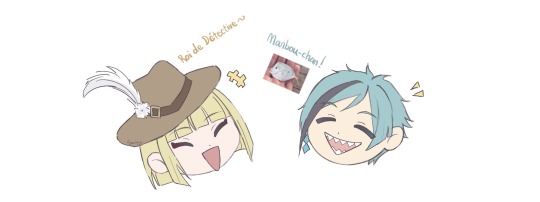
rook calls them Roi de Détective (self-explanatory) and floyd calls them Manbou-chan (moonfish)!
2. inspiration: is your twst OC inspired by any villains? concepts? anything disney-related?
shin is not inspired by any villains or disney characters. i've actually talked about their inspo in this post!
3. age/birthday: how old is your twst OC? when is their birthday? whose birthday (among the cast) is closest to your twst OC's? does the horoscope lie or do they get along well?
shin is 16 at the beginning of the game (like the other first years) and their birthday is on september 29 (libra). ace's birthday (sept 23 and also a libra) is the closest to shin's, and the horoscope does not lie! ace is one of the closest friends shin has made in twst.
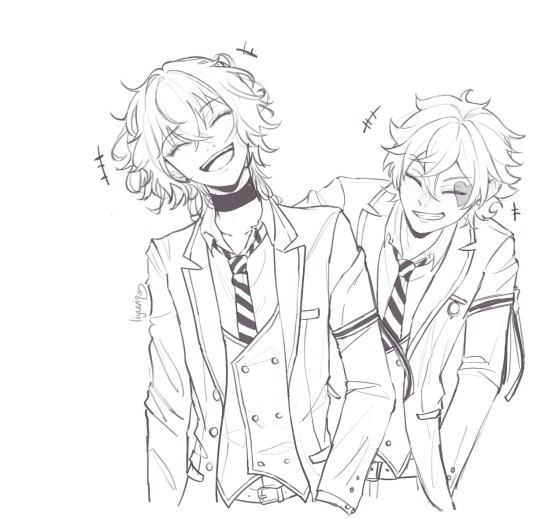
4. dorm: which dorm is your twst OC in? why? which qualities they have make them suitable for said dorm? do they have a roommate and how is their relationship?
shin is in the ramshackle dorm and the reason is the same as the canon yuu's. grim is their roommate! those two always fight like siblings (shin especially likes to tease grim) but are also the ones who get protective when someone tries to pick on the other. they may fight, but they got each others' back ^^
#twst#twisted wonderland#twst oc#ace trappola#twisted wonderland oc#my art#twst yuu#floyd leech#rook hunt#art#twst art#disney twisted wonderland#digital art#original character#.🎀 yuvoc: shin#.🎀 yuvoc#.🎀 yuart#.🎀 yoodles#.🎀 yuvoc: shin | get to know higashikuramori shin!#twst mc
90 notes
·
View notes
Text
My sister and her husband got me some Legaue of Villains card packs for my birthday and they wanted to watch me open them and I was like “You don’t even know these characters” and they’re like “Of course we do!” and started listing off names for them— so here are some of the names

Twice — “Punisher” and also “Deadpool”

Spinner — “Turtle Man” (not heteromorphobia 👀)

Mr. Compress — “V for Vendetta Guy Fawkes Man”

Toga — “Lil Fangy”

Dabi — “Franken-Face” (RUDEEEE)

Kurogiri — “Bartender” (I mean, accurate 🤷🏻♀️)

Shigaraki — “Hand-Face” (of course)
And my favorite:

Moonfish — “BDSM Guy”
194 notes
·
View notes
Text
Heroes and human rights
There are days I honestly don't know which sort of message Horikoshi was aiming to deliver.
I'll rephraise.
I do not really expect BNHA to have laws which are diametrically different from real life Japan.
If Japan is okay with a policeman shooting an escaping criminal in the back, provided said criminal is considered dangerous enough, I don't really expect Horikoshi to make a big deal of how Hawks killed Twice.
It doesn't mean I agree, just that I think Horikoshi might not have been raised in an environment in which this is considered wrong... or that he just wants to show the downside of it, raise discussion over the topic.
However, when he deliberately worsen things and none of the supposed good and noble characters express concern I... don't know if he realizes which is the message he ends up passing.
I'll clarify.
Japanese prisons are known for violating human rights.
BNHA prisons violate human rights EVEN HARDER.
I'm not just talking of how AFO is sent in Tartarus without a trial, or of how Tartarus is a prison that hosts males and females.
AFO is denied any information from outside, when in Japan inmates must be provided with access to information on principal current affairs through media such as newspapers kept at the penal institution and news report broadcasts and also be allowed to read books. Yes, it's a right that can be revocated but it's much better than nothing at all.
We see him, Moonfish, Stain (for a period) and Muscular, wear strait-jackets and being tied to a chair, a chair, not a bed, when Japanese inmates wear leather and/or metal handcuffs which are secured tightly to a metal-strengthened leather belt so that the prisoner’s hands are fixed securely at either the front or the back of the body solely when they're being punished (which yeah, it's still a violation of human rights but it's BETTER than what Tartarus does).
Apparently everyone is in solitary confiment, when in theory in Japan you can keep inmates in solitary confinement for three months (the period can be extended) if they had violate the prison’s rules (which yes, it's more than human right recommend but it's BETTER than what Tartarus does).
Chisaki isn't given prosthesis for his arms and while Japanese prisons theoretically should allow prisoners to keep glasses but can still deny them such right, denying him prosthesis is a lot more damning for him.
In Tartarus no convict seems to have shoes, in Japanese prisons they've sandals and they can wear socks, never mentioning the cells have tatami floors where this doesn't seem to be the case in Tartarus.
And we've people like Tsukauchi, Gran Torino, All Might, Eraser Head, Present Mic go there, witness all this and... shrug it off.
It's not that Horikoshi doesn't know human rights are being violated and thinks that's the norm. The guards at Tartarus CLAIM they got plenty of accusations of human right violations, the leacks coming from an unknown source... meaning it's not just a defamation campain, it's the truth.
One would think that in a story about offering a helping hand this would be addressed but no, La Brava praises Gentle's time in prison, Nagant wants to stay in prison, Shishikura talks of his father, a prison guard who might have been the one who defined inmates as animals, as the one who inspired him to protect and not to search for revenge... and no one talks about reforming prisons.
Plenty of convicts escaped prison worse than before because prison didn't reform them at all, didn't correct them at all and society is fien with prison this way because, as said with Tartarus, they just want to forget those people exists... which is worse than in Japanese prisons as they're, at least verbally, meant to make an effort to reform convicts.
Sure, maybe Horikoshi's idea is that I shouldn't think too hard at this but... then why showing a worse world if it's meant to be dismissed?
The fandom made up whose wonderful Quirk erasing bracialets and Quirk erasing drugs and Quirk erasing whatever that would have allowed him to depict prisons as they are in real life, no need to make them WORSE... and he could have still freed the convicts by causing the Quirk erasing bracialets to malfunction or something, same as he opened their jails.
Honestly, it's something that never fails to upset me because at a first glance it seems he wants to criticize all this and then... he just embraces and handwaves this as if it was okay.
Let's focus on stopping kids from becoming Villains, who care if we're making pre-existent Villains worse, who care if we're abusing their human rights? They don't deserve a helping hand.
#boku no hero academia#bnha meta#mha meta#bnha spoilers#Yagi Toshinori#Torino Sorahiko#Tsukauchi Naomasa#Aizawa Shouta#Yamada Hizashi
74 notes
·
View notes
Note
Trios that would have been more compelling and less obnoxious than the "Wonder Trio":
Izuku, Tenya, Ochako: This needs no explanation
Izuku, Tenya, Shouto: Again, this really needs no champion vouching for it. The Stain arc and the subsequent character work that came with it will never be matched by any other arc in MHA.
Izuku, Denki, Yuga: These three all have self-harming quirks that can be really dangerous and inconvenient during a battle. It was truly a lost opportunity to see these three bond over their issues. Making Izuku and Yuga being close friends right off the bat would've have been really beneficial in sowing the traitor plot point early on and would've have also been far more devastating for Izuku during the reveal. And honestly, Yuga being formerly quirkless and having a self-harming quirk is a much better narrative parallel than the "Save to Win and Win to Save" bullshit that we got. Denki and Yuga just seem like they'd have really good chemistry.
Izuku, Tenya, Momo: These 3 intelligent specimens would've have been extremely overpowered if Hori actually cared enough to develop them. Also, Momo would get to shine because her quirk is powerful as hell (I actually head canon that she has the strongest/most versatile quirk in 1A and maybe enough the BNHA verse as a whole) and it's a crime that her intelligence and OP quirk went underutilized. Also, Momo and Izuku helping each other through their lack of self confidence would have been really touching and maybe have Izuku reflect on his life and how he was treated pre OFA. Momo and Tenya also seemed really no nonsense in the beginning when she ruthlessly criticized Bakugou, so this could help Izuku cut Bakugou off much earlier and allow him to grow.
Izuku, Tsuyu, Mineta: Yes I know, I know. Mineta sucks. But even so, these three were super compelling and interesting to watch during the USJ arc. The ways in which they used their quirks to escape death has way more charm and personality in their hair follicles than post season 3 ShoBakuDeku have in their entire bodies. Also, since Tsuyu was one of the first to call Bakugou out, I feel like her bluntness would be a really good reality check for Izuku to realize that the way Bakugou (and Aizawa) treat him is not okay. Also, Mineta already idolizes Izuku (which is actually sort of sweet) so this could have been used to develop his character rather than the awful and repetitive perv shtick that we're unfortunately stuck with.
Izuku, Shoji, Tokoyami: Like with the above trio, their forest camp sequence in trying to escape dark shadow has more personality and authenticity in their hair follicles than anything having to do with the stupid wonder trio. After all, the whole thing started because of Tokoyami witnessing Shoji being harmed by moonfish, which feels really raw and touching. Shoji also carrying Izuku on his back is super cute. These three also could've been used to address quirk-based discrimination, which is basically that backbone of BNHA's premise (even if it is always glossed over). Tokoyami and Shoji would've had to be victims of heteromorph discrimination (I think it was even confirmed in later chapters) which could drawn the three to each other. No offense to Shouto (and full offense of Bakugo) the two of them could never really relate to Izuku's trauma especially since Bakugou is responsible for 85% of it. They're both rich, they were both born with extremely powerful quirks. While Shouto is tragic because he was abused, he also benefits from the system of powerful quirks being favored which makes the two of them privileged. I also feel like Shoji and Tokoyami finding out about OFA and Izuku's previous quirklessness would just strengthen their bond and would motivate them to help and protect Izuku in any way they can unlike Bakugou who was a total nuisance the entire time.
Izuku, Mei, Ochako: Again, like with the last two, their admittedly limited time on screen together has more charm and personality than the stupid Wonder Trio.
These are the ones that I could think of from the top of my head. Feel free to add anymore.
These are all so cool! I especially liked Izuku, Denki, and Yuga. I always thought Izuku and Denki should have had more interactions anyway. And of course I love Izuku's scenes with Yuga. This is definitely a more unique one.
I would add Izuku, Momo, and Shoto to the list because I love the thought of Izuku being super intimidated by them only to be like, "Oh, oh no they're just isolated rich kids who have never talked to another kid their age and they're mine now" and adopts them.
Also, Izuku, Fumikage, and Shoto. I feel like they're fun.
It's not an Izuku trio but I'd also love Ochako, Tsu, and Momo just because they're best girls
89 notes
·
View notes
Note
Sorry if this question rubs you the wrong way, but wouldn't going out of their way to try to help villains to the absolute extreme that you propose be a bit suicidal? I feel like trying to talk no jutsu criminals like Moonfish who's a serial killing canibal, or Muscular who doesn't have any actual reason for commiting violence against others other than he enjoys it, would end up getting people hurt or worse.
Idk, maybe my perception is skewed because my country has problems with the justice system being too lenient with criminals, but then striking hard against honest folk.
Like, let's say heroes try to talk to Muscular about his feelings and stuff, and he just beats them to death. So should they arrest him and take him to jail now, or should they respond "understandable, have a nice day" and let him carry on with his rampage and try to talk no jutsu him the next day?
I’ve had enough exchanges with you, rvg, to assume you don’t mean it this way, but I gotta say, this is an incredibly fallacious way to frame the “talk to Villains” discussion. I wrote two responses to this, first a characteristically long and rambly response which you and anyone else who’s interested are free to read below the cut. The second response is much shorter and is here above the cut, if only for those readers who think it’s a waste of time to try and give a sincere answer to what reads like deliberate reductiveness—though again, I don’t think that’s your intent.
Here is my model version of how Heroes should engage with Villains:
Step One: Heroes should put in a basic, good faith effort to defuse and de-escalate every Villain encounter they have with the tools and knowledge they have available; the ideal result is that the Villain will choose on their own to stop presenting a danger to the public.
Step Two: If that is not feasible for some reason, or if it is ineffective, then the Heroes should make all possible efforts to arrest the Villain with the minimal possible harm.
Step Three: If there is an immediate threat to the lives of bystanders and there is absolutely no way the Heroes can come up with to stop the Villain non-lethally, then there should, afterwards, be an investigation into the death of the Villain and all Heroes who were involved should have to face questions about their role in the situation and their decision to use lethal force. Measures should then be implemented to help prevent the situation from arising again in the future. A Hero killing someone should by default be treated as a punishable failure, not a victory.
That’s it! That’s all there is to it! Try talking first, then try arresting, and if killing is truly the only way, be ready to explain why. That step-by-step should be the standard, and if there are going to be deviations from it, they should be exceptionally well-justified by both the characters and the narrative. If that’s not the standard, then I think it’s a key thing we need to see the protagonists confronting and changing.
Hero Society is obviously in the not-the-standard camp: most of the Heroes spend most of the series jumping straight to Step Two, totally skipping Step One; there are then multiple instances of Step Three being botched completely, with non-lethal tactics being discarded or ignored and lethal force being accepted without question or resistance. By the end of the series, a tiny handful of Heroes are now hesitantly attempting what should have been their very first go-to, Step One, but their prior reliance on Steps Two and Three make the Villains much more resistant than they might have otherwise been, which reenforces the push towards lethal force in a society that will still not enforce any consequences for it.
This would all be more forgivable if not for the way BNHA positions its Heroes, as lawful defenders of the status quo in a basically modern version of Japan—i.e. they’re cops but the story either doesn’t want to saddle them with the responsibilities real cops would have or else Horikoshi has some alarming views that treat said responsibilities as bothersome administrative red tape.
Therein is my fundamental complaint: BNHA makes the choice to frame its Heroes as being basically specialized police but then disregards or attempts to minimize how that framing colors the Heroes actions’ and decisions, especially with regard to the Villains. My thoughts on what the Heroes “should” be doing are nothing more than taking that framing (Heroes = cops) to its logical conclusion and asking the story to treat the Heroes accordingly.
Below the jump, find the longer version of this answer, which contains more picking apart of the ask’s premise, more references to the canon and to real life, and an extended discussion about the non-Hero institutions in BNHA that are in some way responsible for Villains and what Heroes’ obligations are re: those institutions. It is, in other words, the version of this answer that’s 4000 words long instead of 500. Reminder that it was the version of this answer that was written first, so pardon any recycled phrasing or reiterated rhetoric.
I’ll just start by re-pasting the question…
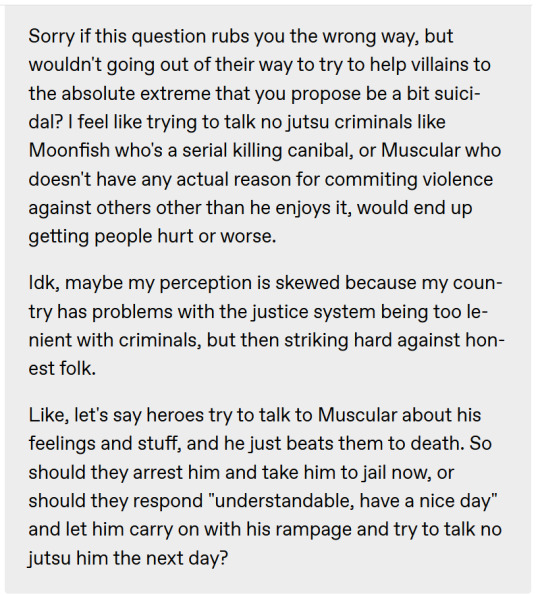
What I think is that there is a lot of air between “beating up Villains while being more concerned about the news camera catching your good side than you are about talking to the human being you’re pummeling” and “trying to talk to the Villain but just shrugging and letting them carry on if it doesn’t work”.
A perennial response Villain fans get when they talk about this is an exasperated, even outraged, “What, so you’re saying Deku should just let Shigaraki kill him or innocent people?!” And like, no, that’s not what we’re saying at all, and it’s a really reductive, bad faith characterization of the argument. So I want to talk first about what Villain fans are saying, and then I’ll circle back to your question about trying to talk no jutsu the really bad news Villains and what Heroes should do if that talk no jutsu fails.
First things first, and to get it out of the way, not all Villains are on the level of Muscular or Moonfish. For the vast majority of the series, the numeric bulk of Villains are just street criminals. It would not be a life or death struggle for Kamui Woods and Mount Lady to try and talk down a purse snatcher together. There is so much room for positive change in how Heroes engage with street-level Villains that just gets glossed over entirely when people want to spin-kick the argument all the way to S-class threats like post-surgery Shigaraki.
Note how handily and briskly Hawks deals with the nudist flasher guy when he’s walking around town with Endeavor—he doesn’t even glance in his direction. Would it have been so impossibly hard to use his feathers to pin the guy’s coat back together and then cheerfully ask him why he went and did a thing like that?
So just keep that in mind, first of all: for the vast majority of what a Hero does day-to-day, especially the powerful ones who are way up near the top of the rankings, there are options available to them beyond “immediately resort to extreme violence” or “give the Villain a thumbs-up and walk away, whistling to cover the sound of civilian screams.”
But okay, how about with the more dangerous Villains? Well, the point still stands: multiple heroic characters throughout the manga show themselves to be entirely capable of carrying on a conversation—be it with the Villains or with Hero allies—while fighting. Mirio is able to temporarily keep ShigAFO talking and distracted by simply asking him a few basic questions; he and Nighteye both are able to get at least some answers out of Overhaul(!) just by asking about his intentions. Ochaco and Toga have coherent conversation every single time they fight. Hawks and Twice have a whole argument while fighting. As soon as Shouto can be bothered to talk to Dabi, Dabi’s eager to spill his whole backstory to him.
Shigaraki in particular comes off as desperate to share his grievances practically every time Heroes encounter him, and that only stops being true at the very end—and even there, it might be less true if that green twit fighting him could have been arsed to just fucking ask him, “Hey, last time we fought, when we were in the same headspace, I saw an image of you crying with a dog. What was up with that?” Deku doesn’t have to stand there with his hands in the air while asking! As all the examples cited demonstrate, Heroes are more than able to fight and talk at the same time. So why don’t they try to make that talk a little more actually useful?
What I’m saying is simply that I would like it if less of that conversation were dedicated to Heroes giving moralizing sermons about how bad and unforgiveable Villains are and a lot more of it were dedicated to Heroes just asking why the Villains are doing what they’re doing, and letting the conversation go from there, fighting defensively and keeping the Villain focused on them as much as they’re capable of doing. We see the results in the series when Heroes bother trying this—think Deku’s results with Gentle Criminal or Ochaco’s with Toga—so it’s damning that they don’t try it more often.
The likely explanation is that professional heroism as a matter of practice and culture does not tend to bother with de-escalation tactics; after all, while you’re standing there trying to talk to the bank robber, some other Hero could easily be coming in for the take-down, and then they get all the credit and glory and not least the pay. The whole system is geared towards rewarding fast, uncompromising takedowns, ignoring the possibility of more peaceful, productive resolutions in favor of stopping the Public Disturbance as quickly as possible, because it’s more important to stop random civilians feeling inconvenienced than it is to maybe try addressing a Villain’s issues so they stand down themselves and are less likely to become hardened criminals.
Heck, even Deku really only gets anywhere with Gentle because his first instinct—shutting down the fight right away with a Smash—gets him rebounded off an air trampoline with enough force to knock him back nearly a neighborhood block. The defensive, evasive nature of Gentle’s power means it’s difficult to hit him directly, and Gentle’s personality was such that he kept talking while Deku was figuring out how to beat him. That talking was really what gave Deku enough insight to trigger his empathy, so he started returning the conversation in ways that he never did against e.g. Stain, AFO, or in his first fight with Muscular. He didn’t lead by asking why Gentle was invading his school, though; he just ordered him repeatedly to stop.
Heroes and, in turn, the kids, just don’t default to trying to talk to the Villains. We see that they can, they’re just not trained to, so it becomes a tactic of last resort, or of distraction, or, finally, as being the result of moments of connection that make them incapable of continuing to ignore the Villains’ humanity. But when it’s a last resort like that, when they don’t bother asking questions until after the Villains have been pushed past the point of wanting to engage, everything gets so much harder and more dangerous.
Look at Shigaraki and Toga. When Deku and Ochaco initially encounter them, the kids’ first response is basically just revulsion and terror. And like, okay, they’re students, newly fledged Hero Course trainees. They shouldn’t have been facing real life Villains for another two years, at least! So it’s not surprising that they don’t know what to do and don’t react in the most empathetic manner possible. I’m not blaming them for that. But I do want to ask what would have happened if their classes and the Hero culture were more focused on attempting dialogue with Villains.
All Might at USJ writes Shigaraki off as a faker with no real beliefs, and Deku at the mall calls him an incomprehensible cipher, but what if either of them had instead asked Tomura why he was there and what he wanted, then asked follow-up questions from there? How much earlier might they have found out that Shigaraki had some tragedy in his past that he blamed All Might for not saving him from? What might finding that out early on have led them to change about how they approached Shigaraki in subsequent encounters?
If Ochaco and Tsuyu had asked Toga why she attacked people, then followed up on whatever answer Toga gave about liking blood with some questions about consent, how much sooner might they have found out that Toga spent her whole life feeling ostracized and repressed because she was convinced by the adults around her that people finding out she craved blood would make her a freak in their eyes? How might they have engaged with her differently if they realized her parents had been verbally abusing her since she was three years old?
But we also don’t have to stop with U.A. types! Toga went on the run at only 15—how many times did she have had close scrapes with arrest before the training camp attack? How many other opportunities were there for someone to talk her down before she made it to the League? Heck, even all the way to the end, if the green twit hadn’t just insisted on antagonizing Toga one last time for the road—as if he’d learned nothing at all since the mall scene!—how much more easily might Ochaco have been able to engage with her? Maybe if Toga hadn’t set her mind to embracing Villainy because Deku functionally became yet another person calling her a freak, Ochaco could have gotten to the breakthrough point before Toga stabbed her in the gut?
I’ve been talking about the more sympathetic Villains here so far, but all this goes for the rest of them, too. Sure, Moonfish is a cannibal serial killer now, but was he always? Or was there a time when he was just like Toga, a teenager wrestling with quirk-driven hungers who was abused and ostracized for them? I’ve thought, from time to time, about the idea of a League ageswap AU, where Moonfish is that scared but defiant teenager who’s been pushed over the edge and done something violent, but is not yet past saving. Conversely, it’s all too easy for me to imagine a Toga who was never captured and never shown any compassion growing into an adult who fully embraced her vampire serial killer reputation and “deviant” hungers to become just as much an alleged monster as Canon Moonfish.
How about Muscular? Was he always a violent sadist? Was it impossible that he could have grown up to be anything else? Could that taste for violence ever have found an outlet other than murder? Could he have gotten into underground fighting, like Rappa? Could he have become a Hero like Mirko, always hungry for a better challenge than she’s getting? Quite frankly, even if Imasuji Gouto was a violent little bully who killed neighborhood pets as a child, he still deserved some kind of intervention—psychological counseling, medication, more acceptable outlets, etc.
How many Villains would HeroAca!Japan be spared if the people in power were more focused on intervention and rehabilitation at every stage of a Villain’s life and career? Why do Heroes think it’s helpful or necessary to tell everyone in earshot their personal opinion about the unforgivability of their opponents? Why is it such a problem for some readers when Villain fans point out that a lot of issues could be sidestepped entirely, and the HeroAca world considerably bettered, if the Hero Industry were less focused on showy grandstanding violence, less terrified of the optics of being anything other than maximally harsh on Villains?
That all said, that’s the nuance of what I want when I say I want more talk no jutsu. But let’s go back to your question—what should Heroes do when they run into Villains who can’t be talked down?
Say that all the interventions and counseling programs have failed, and someone—some mother’s son, some father’s daughter—has grown up to become a Villain. And not just any Villain, but a really dangerous one. What do?
Well, I do still want to see Heroes try to talk first, unless they have some reason to believe talking won’t work, like knowledge that knowing that efforts in that direction have already been made and documented in previous encounters between law enforcement and the Villain in question. There’s also some flex here based on how capable of dragging out an encounter the Heroes on-scene are, and how much danger any bystanders would be in—I would want more effort from someone who can hold their own for long periods like Deku than e.g. Manual. But like, anyone can yell a few basic questions about motivations to see what sort of response they get.
But say our Hero is up against someone like Muscular, who just laughs off questions like that. What to do then?
Then arrest him.
Seriously, this is not that complicated. I’m not asking some run-of-the-mill Hero to get their arms ripped off trying to give battle therapy to Muscular! But I do want Muscular to get therapy, or at least be offered it, once he’s no longer presenting an immediate threat and those conversations can happen in a safe environment. And if he doesn’t accept it,[1] I still want him to be treated as humanely as reasonably possible in prison, with the therapy option always on the table if he ever wants to try it. I also want his prison term (even if it’s for life) to not involve methods of punishment that are considered by the United Nations to constitute torture, like Tartarus’s apparent extended solitary confinement.
1: Perhaps because he would rather rip his own arms off than talk about his feelings or waste any more time getting analyzed by shrinks than he already has; pick your poison based on why and for how long you think he’s been killing people.
I truly do not have any problems, ethically speaking, with Heroes arresting dangerous Villains. My problem has always been that Hero Society is comprehensively awful in how it treats those who don’t fit neatly into society’s little boxes. Their social support networks are full of holes, their law enforcement is financially disincentivized from attempting de-escalation, their judicial process is completely invisible, and their prisons are concrete holes that only serve to make people worse, as we can see clearly in the case of people like poor Ending—already unstable when he was first arrested by Endeavor, but so blatantly suicidal when his sentence is up that the literal first thing he does after release is to investigate Endeavor’s personal life so as to find a way to goad Endeavor into killing him.
Now, sure, Heroes are not responsible for prison policies and practices; those are under a completely different part of the criminal justice umbrella. Nor is it up to them to determine how e.g. financial aid programs or family services work. But I want Heroes to be better in the ways that they—personally and professionally—can be, and I want them to be cognizant of the flaws in the system they uphold. I want them to have some basic intellectual curiosity about the Villains they fight—why they turned out like they did, if they can be helped, and what’s going to become of them after the Hero hands them off to the police.
Like, what is All Might’s opinion on Tartarus? He spent 30+ years fighting for the society that maintains it—does he think or care at all about the fact that some extremely damaged, abused people wind up in there after he gets done beating them up? And if he doesn’t, what does that say about him? What would Ochaco have done if Toga had lived and said she’d rather Ochaco kill her than let her go to prison forever? Does Shouto think now about the family situation of every Villain he fights, or did his ability to care about “some mother’s son” begin and end with his mother’s son?
Obviously, Heroes stop Villains all the time; I’m not asking them to do deep dives into the history and treatment of each and every one. I just want them to ask the questions they can while the Villain is in front of them, and to care about the state of both the systems that produce Villains and the ones tasked with their care. I think that when handing people over to state custody, Heroes have a responsibility to be meaningfully confident that the state won’t abuse that custodianship. If they aren’t—if they truly don’t give a shit about what happens to Villains once the police van door swings closed—then in my view they’re no different than any professional who shirks their duty.
So many people insist that the kids—that Heroes in general—have no duty to care about the Villains, but to me, this view comes off as wildly ignorant about the wide variety of jobs in the real world that do, in fact, confer a duty of care.
If…
…a teacher sees a child with unexplained bruises but doesn’t bother to do their due diligence as a mandatory reporter—
…a prison guard leaves a handcuffed inmate alone in a room with a fellow warden wearing brass knuckles—
…a medic doesn’t speak up when a flight attendant asks if there’s a doctor on the plane—
…a bartender just keeps on serving someone who’s obviously intoxicated and then lets them stumble out the door to the parking lot—
—then they are shirking their duty. There is no shortage out there of examples of this sort of responsibility, one that you can be held legally responsible for, one that you choose to accept when you sign up for the job.
Heroes are not Samaritans doing the work out of the goodness of their hearts; they’re not vigilantes just trying to keep their own patch safe. They’re government employees, crucial members of the lawful system they represent. They have to care—not personally, not individually, but on a professional, structural level, they have to care about the people they fight because the system has to care about those people. And if the system doesn’t care, the system has to be changed.
I'm segueing here into real life stuff, so let me note as a disclaimer that what follows is based on my cultural familiarity with American policies, as well as periodic research into that of other nations. I don't know what country you live in, rvg, so I can hardly speak to its crime-and-punishment situation. This is all a lefty American's opinion on what reading she has done about American, Japanese, and, in the case of this particular post, Scandinavian criminal justice systems.
That said: in real life, de-escalation works. One of the things you’ll often see talked about in police reform/abolishment circles is that the police are, quite frankly, doing too much work. Or, more specifically, they’re doing the wrong kind of work, work for which their training has not prepared them and which other groups would be far better suited to handle.
Here’s an article on offering a campus police force de-escalation training and the resulting 26-36% drop in injuries suffered by both civilians and officers; it also talks about how de-escalation tactics are used by SWAT teams but regarded with suspicion by patrol officers, with this quote being particularly telling: “[Special operations] officers were taught to use time, distance and cover to their advantage. For patrol officers, time was viewed as 'The more time you give a suspect, the more danger you're in.'” De-escalation is not the usual training patrol officers get, so it runs against their gut feeling, despite its proven effectiveness—compare this to BNHA’s repeated focus on speed in shutting down altercations.
Here’s an article on the results of a test run of a program in Denver, Colorado, in which police officers were completely removed from response teams to 911 calls about situations considered low risk (drug abuse, trespassing, welfare checks, etc); instead, teams of mental health specialists and paramedics were dispatched. Reports of nonviolent crime dropped 34% over the course of the time the program ran, and the direct financial cost of the response was four times lower than sending police.
The classic dramatic image of this sort of thing is the hostage situation—and when I looked into it, numerous articles said that containment and negotiation tactics have over a 94% chance of resolving hostage crises without fatalities!
The common element in this sort of thing is refraining from showboating displays of force, loud assertions of power and authority, arguments, moralizing, threats, and so forth. Far more effective is listening, active attempts to communicate and understand, not throwing one's weight around and not rising to aggression even when provoked.
Meanwhile, on the carceral side of things, restorative justice leads to greater satisfaction from both victims and perpetrators, more feeling that they were listened to and respected, and increased belief that justice was served. While the evidence on its impact on recidivism is mixed, it certainly doesn’t seem to be less effective than traditional retributive justice, and may well be considerably more effective if combined with programs that focus more specifically on lessening recidivism than restorative justice alone (research is ongoing).
This article on how “cushy” Scandinavian prisons are far more effective at reducing recidivism than their much harsher, bleaker American counterparts argues that a crucial factor in reducing recidivism is minimizing the amount of resentment criminals bear towards the system. When perpetrators can point at unjust or disproportionate punishments, cruel treatment by wardens, rejection by society, etc, it’s much easier to stew on resentment, to turn nastier themselves, to blame outside factors. Conversely, when life inside prison is made as much like life outside prison as possible with the key difference being the crucial deprivation of freedom, that resentment is defanged, leading to more more self-reflection and willingness to accept responsibility. And again, it works: Norway is a world leader, with their recidivism rate being a mere 20% compared to the U.S.’s nearly 77%.
The studies and the evidence for this stuff is out there, it’s just fighting this huge, ugly uphill battle against people who care far, far more about inflicting punishment than they do actually improving outcomes. And so much of that is based on cultural values—what people believe, what values they’re taught. That's where pop culture comes in.
That last article I linked above talks about the efforts made in the U.S. to turn prisons into a for-profit industry, and how demonizing criminals to encourage maximum sentences helps that effort; here’s another on how U.S. police departments rehabilitated the popular image of the police in the early part of the 1900s as bumbling fools or a corrupt gang by consulting on the writing of police procedurals, most crucially starting with Dragnet in 1951, but continuing even today. Here’s one on a growing concern in Japan about the relationship fostered between TV studios and police when police permission and cooperation is required for filming those popular reality TV police documentary programs.
Mass media and pop culture informs this stuff. True, Horikoshi is not having to get his work cleared by a police PR department to publish it, but you can see from the above how the police have used and do use mass media to polish up their image; they see it as an effective tool to use because it is. And the closer to our reality a work of fiction is, the more obviously it resembles the world around us, the more it seems to purport to moral instructiveness, the more true that becomes. That’s why I criticize BNHA much more harshly than any number of other manga or anime I follow where Good Guys Kill Bad Guys all the time and no one thinks twice about it: because those series aren’t parading the Good Guys out as Japanese citizens working with Japanese police under Japanese law to maintain the rosy image of the Japanese status quo.
I’m long past the point where I’m just rambling, so I’ll wind it down here by pointing out this: Horikoshi also thought that things in his world needed to change. As much as I loathe BNHA’s endgame and think much of its epilogue is trite shoulder-patting pablum that fails to meaningfully address the setting’s real problems, multiple aspects of Hero Society were at least nominally challenged and subsequently changed: citizen inaction, the dominance of professional heroics as a career path, the diminishment of non-Hero careers, quirk-based discrimination. As a direct result of the main characters’ efforts to address places where the old system was failing people, the incident rate of Villains is decreasing.
The fact that these changes are made provides in itself the evidence that they needed to be made. I think they need to go further still: my number one greivance with the epilogue is that we've seen all these changes aimed at reducing the numbers of Villains that arise in the first place, and that's nice and all, but we don't see any evidence that the Villains that do arise are treated any differently than they ever were, not even the common purse snatchers, much less the serial killers, the cannibals, and the terrorists.
So, should Heroes have to get themselves nearly killed trying to reform a Villain? Ideally no, but that assumes a world where Heroes are working in concert with a bunch of other people who are also dedicated to preventing, reforming, or rehabilitating Villains. If none of that other personnel infrastructure exists, then, well, to paraphrase Nedzu, someone has to take the first step. Why shouldn’t it be the combat-trained professionals with shounen battle stamina who also happen to be the main characters?
#bnha#bnha gets real#long post#bnha hero society#bnha muscular#bnha moonfish#league of villains#no. 2 green#bnha critical#stillness answers#i know applying real life criminal justice philosophy to shounen battle manga is an endeavor that is only less doomed than it is pretentiou#but what is one to do when faced with a work like bnha#and the false binaries its narrative all but begs its readers to embrace#randomvongenerico
89 notes
·
View notes
Text
Guesses I've seen On Who Mystery Person Is:
1) New Character, escaping captivity of some sort
Tartarus/jail escapee
Victim to be saved, chance for Deku to 'make up' for failing to save Shigaraki/Tenko
A potential Villain to be prevented; "AFO was born during chaos like that."
League of Villains fan/follower, freeing themself now after the Villains' defeat
2) Tenko
Somehow reborn/resurrected/reconstructed, possible memory loss
Tenko clone, courtesy of the Doctor
Original body; Shigaraki was a Noumu clone
3) A 'Shigaraki Tomura' spare, like from the orphanages the Doctor kept
4) Shirakumo/Kurogiri, reborn
5) Tenko/Kurogiri fusion
6) Spinner, after losing his scales and quirk?
7) Old Villain, new look
Moonfish, unmasked
Tabe, with longer hair
Mustard
8) Toga Himiko's sibling, held captive by their parents to prevent another incident
9) Deku's dad
132 notes
·
View notes
Note
RIP League of Villains, you were dead on arrival.
Listen, I’m not against humanizing villains but some people in the MHA fandom act like the LOV did no wrong and were only thinking about society.
Like.. did we watch the same show? The LOV stated multiple times that they basically wanted anarchy.
*Describes Shigaraki’s atrocities that fucked up their lives* “B-But he liked video games 🥺”
Good for him, HE STILL KILLED PEOPLE AND ONE OF THEM WAS A CHILD!
I honestly wish that people would address the league’s hypocrisy because it’s a genuinely interesting idea, I plan on tackling it in my fic.
But then again, whenever characters do address the league’s hypocrisy/rightfully doesn’t take shit, they get crucified.
(Aside from Enji and Overhaul, who deserve the shit beat out of them)
Hi @palesweetscherryblossom 👋
I love the leauge and the potential they had and Iam also not against humanising them but little of them actually deserve it would get a proper redemption.
A lot of people seem to forget that toga was already introduced as a serial killer (she killed 6 people and performed blood letting and you can go as far as cannibalism on them)
Or the fact that Dabi only cared about bringing down enji and never actually spoke up about the kids that died in Dr Garaki's hospital.
Or how shigaraki somehow knew all along that afo was manipulating him and done nothing but played into his games. Shigaraki also never proves himself as a leader or worthy of redemption in canon.
Or stain who went around killing heroes left and right. The same with muscular.
Or moonfish who was a cannibal
Oh or maybe compress who I still have no idea why he is evil to be honest or i just forgot.
They all done bad things which is why they are considered criminals while they could be humanised like toga, Dabi, shigaraki and spinner that doesn't actually excuse their actions. The leagues backstory is supposed to give us a reason or a look as into why they became the people they did and how society failed them but it's NOT supposed to justify or make their actions seem ok.
Also the hypocrisy that the leauge members have is actually interesting and could be explored as a character trait that they learn to develop out of or keep with them and it becomes an integral part of their character.
YOU CAN BE A VICTIM AND DO BAD THINGS. A Villain CAN BE A VICTIM AND DO BAD THINGS. THE TWO CAN COEXIST
I simply hate it when people can only look at the leauge as just victims who were completely justified and done nothing wrong when in reality they aren't!!
Now there are characters that I wouldn't give a redemption to like Dr garaki, AFO, overhaul, Enji and the comission but the other characters have a chance at being humanised or getting a meaningful redemption or ending
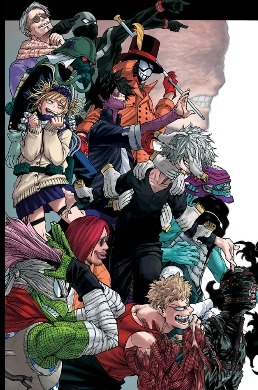
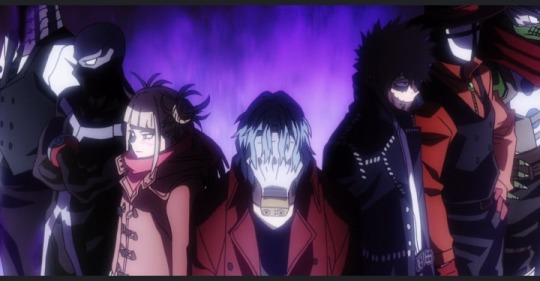

#mha critical#bnha critical#mha#hori is a bad writer#horikoshi critical#bhna critical#bnha#anti lov stans#anti lov#thanks for the ask#thanks for the ask!#some of the league members i cant see being excused and redeemed#like i hate People downscaling and babying their actions#like half of them are serial killers#lov deserved better#lov
67 notes
·
View notes
Text
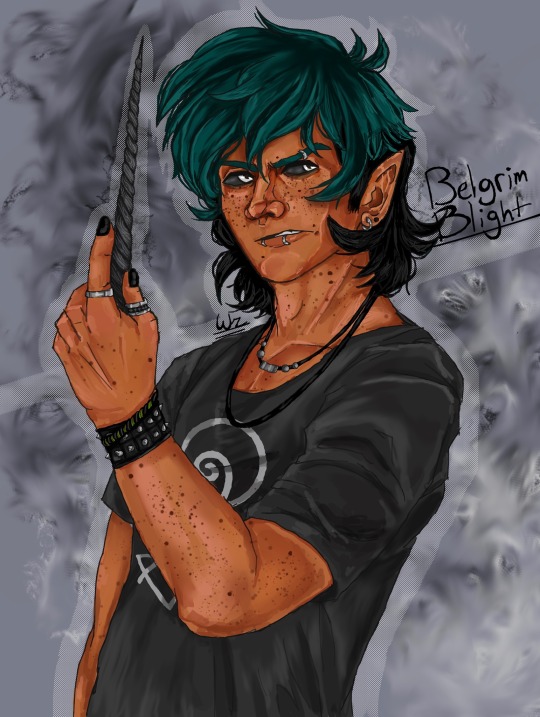
What up Wizblur my friend got me into Wizards and HERE IS MY EDGY SON BELGRIM! No trauma yet b u t he will get some story elements soon…
He loves to fish because I’m insane about it ITSSOFUN-
#wizard#wizard shit#wizard101#wizards101necromancy#necromancer#necromancy#school of death#wizards 101 death school#wizards 101 character#w101#w101 fandom#w101 oc#w101 art#wizzy101#wizzy fandom#wizzy OC#wizzy art#moonfish
28 notes
·
View notes
Note
I love Dabi/Touya but honestly your post about him had me nodding my head in agreement 😭 but hey Dabi had to be a disaster to someone because let's face it - at best he was a small thorn in his abusers path of "redemption" because well it's not like anyone even gave a shit about Enji being an abuser, the civilians were just pissed he did a poor job at stopping Shigaraki in the first war and about Dabi's kills but they don't give two shits about him being a domestic abuser, all the "heroes" don't give two hoots about it either because he cried a lil, changed and is good at his job 😒 like literally has his sidekicks still beside him and hawks is his little cheerleader and well hey he's apparently going to be "atoning" for the rest of his life but hey that falls flat when we learn kids STILL want to be like him in the future!
Real talk. Imagine a universe where Overhaul is a hero and was found to be experimenting on Eri. Let's say a young Kai Chisaki was found by All Might and raised as his son, but then All Might getting hurt by AFO drove him a bit mad. He heals All Might but gets obsessed about "solving" crime by removing people's powers and putting the tools in the hands of heroes to take quirks from villains at will. During a raid on a yakuza base, he finds Eri and The Boss' notes about her power, and he gets some ideas. He takes the kid in as his foster daughter and then her life becomes hell. To the people, he's a famous hero scientist and healer. But behind closed doors, he's an abuser.
The guy could have just done an apology and they'd have forgiven him. "Sorry, I needed to torture that girl because quirk erasing bullets would ensure a society of JUSTICE! But I realize now what I did was wrong and I'm trying to atone." Imagine if this also got leaked during the first war arc, so we've got Endeavor, Hawks and Overhaul all addressing the crowd's complaints at the press conference. But then the only thing people ask Overhaul is "Will you continue to use your quirk to heal us?" And "Will you fix the roads and the damaged buildings using your power?" And he says yes, and they're appeased. None of the good guy characters have an issue with what he did, suddenly, even if they really should. Oh, but it's fine because Eri forgave him, right? An extreme example, but given how no one even thought twice about forgiving Aoyama when he got outed as the traitor and the characters don't even discuss the controversy with Hawks and Endeavor's actions? We had what, a brief conversation when Tokoyami rescued Hawks where Tokoyami told him he did the right thing? And nothing else. The good guys just don't engage if another good guy does something morally dubious. I believe this is entirely on brand for this series. It was pure plot armor and dumb luck that no one ever died as a result of Aoyama leaking information. Imagine if Moonfish had successfully skewered Shoji's heart and then ate him. Imagine if Mustard had gunned down both Kendo and Tetsutetsu and they died from their injuries. What about if the League successfully kidnapped both Bakugo and Tokoyami, but Shigaraki decided he only wanted Bakugo, so he films himself turning Tokoyami to dust so he can send the video to the heroes and news stations to highlight their failures to protect kids? That was entirely outside of Aoyama's control but his classmates didn't care that they all only continue to exist because the villains were thankfully too incompetent to kill them. The crimes of heroes just don't matter. These people allegedly enforce the law but only when a villain is the one doing the law breaking. Heroes are allowed to make mistakes and get forgiven.
21 notes
·
View notes